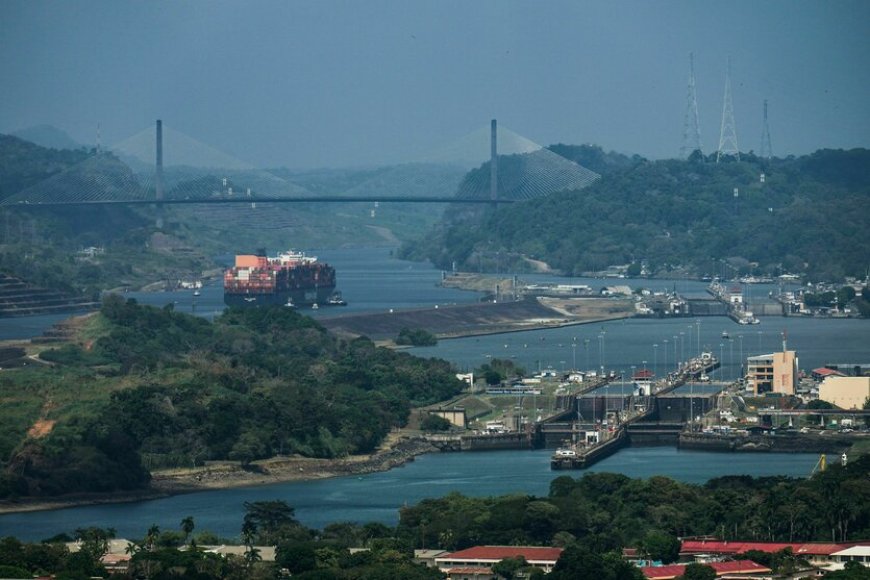China complains about Trump over Panama
The conflict over the Panama Canal is escalating: Panama is distancing itself from China, Beijing is accusing the USA of having a “Cold War mentality”.

Tensions in the trade conflict between the USA and China over Panama are increasing: The USA's behavior in Latin America is "characterized by the mentality of the Cold War," said a spokesman for the Chinese Foreign Ministry in Beijing on Friday. Washington is deliberately sowing discord between China and the Latin American states with "deceptive statements" and "unfounded accusations."
Panama announced on Thursday that it would withdraw from China's global infrastructure project "New Silk Road". The "New Silk Road" is a collective term for cooperation projects such as ports, railway lines, airports and highways that China has now built in around 100 countries in the Global South. Panama was the first Latin American country to join in 2017.
In the Panamanian media, the Silk Road's demise was criticized as a "bowing down to the USA" . President José Raúl Mulino of the right-wing Realizando Metas party, however, stressed that it was "exclusively Panama's decision". His country had hardly benefited from the project. "What has it brought Panama over all these years?" Mulino said at a press conference.
The new US Secretary of State Marco Rubio travelled to Panama at the weekend as one of his first official acts to underline President Donald Trump 's claim to control the Panama Canal. He also said that China's influence on the waterway, through which around five percent of global trade passes, was unacceptable. Trump had accused Panama of "ripping off" the US with fees for using the canal. Panama recently earned five billion US dollars annually through the canal, which corresponds to around three percent of the small country's gross domestic product.
Worldwide Markets and Raw Materials for China
So far, China has responded to Trump's tough announcements with more moderate tones. After Trump imposed 10 percent tariffs on all Chinese imports immediately after his inauguration, Beijing only increased the import costs of individual US products: In future, coal and liquefied gas imports will be subject to 15 percent additional tariffs, and oil and agricultural machinery from the USA will be subject to 10 percent additional tariffs.
For the first time, China has reacted openly angrily to the new US president's trade policy. "We deeply regret Panama's decision," said the Foreign Ministry spokesman. His country "firmly rejects the US's use of pressure and coercion to denigrate and undermine cooperation on the New Silk Road."
Panama is the first Latin American country to abandon the Silk Road project, with which China is attempting to access markets and raw materials worldwide, especially in the global south. Just in November, a new port was opened in Peru, financed by China.
But overall, the "Belt and Road Initiative" is suffering from China's current economic misery. The number of newly completed projects related to the New Silk Road has declined in almost all regions of the world. Instead of large infrastructure projects, the initiative is to become "smaller", "greener" and "smarter". Head of state Xi Jinping had already called for a reorientation in 2023.
For example, projects related to hydrogen or renewable energies are being funded, and the construction of coal-fired power plants is less frequently financed. At the same time, major projects that have already been initiated, such as the construction of a railway line from China via Kyrgyzstan to Uzbekistan, are continuing. The initiative has been criticized internationally because it is driving poorer countries into debt and dependence on China.
China has recently been very successful in Latin America: the value of imports and exports between the region and the world's second-largest economy has skyrocketed from $12 billion in 2000 to $485 billion in 2023. However, there have been problems in Panama: 21 percent of the goods passing through the Panama Canal come from or go to China - making the country number 2 after the USA with 74 percent.
Dissatisfaction with the Silk Road in Panama
However, there is dissatisfaction with the Silk Road project. "We have not seen the real benefits of this relationship," said Omar Jaén Suárez, ex-diplomat and historian to the online medium Estrella de Panamá . China has built a national stadium in the neighboring countries of Costa Rica and even a national library and a national stadium in El Salvador. "It's a shame," said Jaén Suárez.
Panama's President Mulino reacted again angrily on Friday to a statement by the US government that US military ships would no longer have to pay fees for the canal. "That does not correspond to the facts," said Mulino. According to Panama's constitution and the laws of the Panama Canal Authority, neither the authority nor the government may suspend fees.
The Panama Canal, built by the USA, was opened in 1914. In 1977, then US President Jimmy Carter and then Panamanian military ruler Omar Torrijos signed an agreement to hand over the canal to Panama. In 1999, the Panamanian state took control of the waterway, through which 14,000 ships travel every year.













































